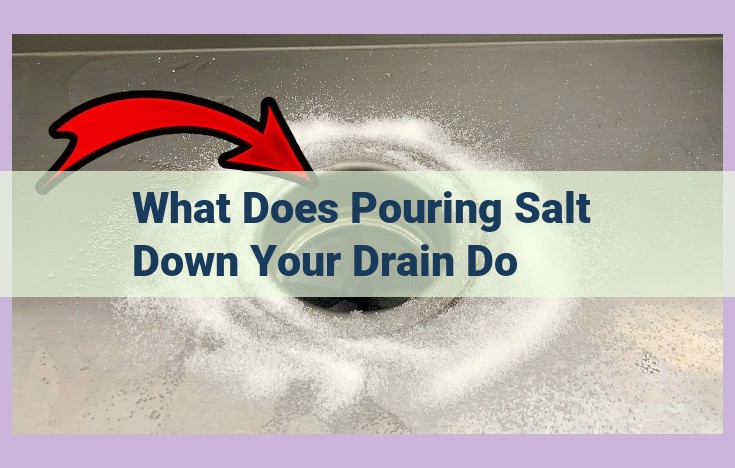Avoid Salt In Drains: Prevent Plumbing Damage And Ensure System Health

Pouring salt down your drain can have detrimental effects on your plumbing system. Salt can accumulate and corrode metal pipes, leading to leaks or blockages. It can also damage fixtures and appliances connected to the drain, such as sinks, toilets, and dishwashers. In addition, salt can harm beneficial bacteria in septic systems, disrupting their ability to break down waste and leading to odors and other issues.
Entities Directly Involved in Plumbing and Drainage Systems
The intricate network of pipes and fixtures that bring water into our homes and carry wastewater away plays a vital role in ensuring our health and quality of life. Behind the scenes, a dedicated team of skilled professionals work tirelessly to maintain and repair these systems, ensuring they function optimally.
Licensed Plumbers
Plumbers are the backbone of the plumbing industry, possessing the knowledge and expertise to install, repair, and maintain all aspects of water distribution and drainage systems. They are skilled in working with pipes, fixtures, water heaters, and pumps to address leaks, clogs, and other plumbing emergencies.
Drain Cleaning Specialists
Drain cleaning specialists are experts in unclogging drains and sewer lines. They use specialized tools and techniques to remove obstructions caused by grease, hair, debris, and tree roots. These professionals play a crucial role in preventing backups and maintaining the flow of wastewater.
Sewer Inspection Technicians
Sewer inspection technicians utilize advanced technology to inspect sewer lines for any damage or blockages. They insert cameras into pipes to assess their condition, identify potential problems, and recommend necessary repairs. This preventive maintenance helps prevent costly and disruptive sewer breakdowns.
Understanding the roles and services of these professionals is essential for home and business owners alike. By working with licensed and qualified plumbers, drain cleaning specialists, and sewer inspection technicians, you can ensure your plumbing and drainage systems operate efficiently and safely, protecting your health and preserving the value of your property.
Utilities and Public Agencies Controlling Water Management
In the realm of plumbing and drainage systems, various entities play crucial roles in ensuring the safe and efficient management of our water resources. Among these, public utilities, water treatment plants, and sanitary sewer districts stand out as key players in maintaining the quality and availability of our water supply.
Public utilities肩负着为社区提供干净饮用水和收集并处理废水的重任。它们拥有庞大且复杂的网络基础设施,包括水厂、管道和泵站。水厂负责从各种来源(如河流、湖泊或地下水井)收集原水,并通过一系列净化工艺去除杂质、消毒剂和有害物质,确保水的安全饮用。
水处理厂通过先进的处理技术,去除废水中污染物,保护我们的水环境。这些设施使用沉淀、过滤、消毒和有时高级处理工艺,将废水中潜在有害的物质转化为无害或可接受的形式。处理过的水随后被排放到河流或其他水体中,减少对环境的负面影响。
同样重要的是,卫生下水道区负责收集和处理家庭、企业和其他建筑物产生的废水。这些地区运营着广泛的地下管道网络,将废水输送到处理厂。下水道处理厂使用类似于水处理厂的过程来净化废水,去除污染物并将其安全地排放到环境中。
这些公共机构在确保我们水资源的质量和可持续性方面至关重要。它们持续监测水质,制定并实施法规,以保护我们的水供应不受污染。它们还投资于基础设施升级和研究,以改善水处理和分配系统的效率。
通过共同努力,公共水务部门、水处理厂和卫生下水道区共同确保我们拥有清洁、安全的水来饮用、洗澡和灌溉。它们是我们日常生活中不可或缺的一部分,值得我们关注和欣赏。
Entities Dedicated to Water Quality and Environmental Protection
Protecting our water resources is crucial for our health, environment, and future. A wide range of organizations are tirelessly working to ensure the quality of our water and minimize its impact on the ecosystem.
Environmental Protection Agencies (Local, State, Federal)
These agencies enforce regulations, monitor water quality, and conduct research to reduce pollution. For example, the Environmental Protection Agency (EPA) sets standards for drinking water quality and regulates wastewater discharges into public waters.
Conservation Organizations
Nonprofit organizations like the Nature Conservancy and Sierra Club advocate for the conservation of water sources, such as wetlands and rivers. They educate the public about water issues and push for policy changes to protect these vital ecosystems.
Water Quality Advocacy Groups
Independent organizations like the Waterkeeper Alliance focus solely on protecting water quality. They use legal tools to enforce environmental laws, monitor polluters, and hold decision-makers accountable for safeguarding our waters.
Collaborative Efforts and Innovations
These entities collaborate to implement innovative solutions. For instance, the National Science Foundation funds research to develop new water treatment technologies. Universities partner with conservation organizations to conduct water quality monitoring projects.
By working together, these organizations ensure that we have safe, clean, and abundant water for generations to come. Their commitment to protecting the environment and promoting water quality is essential for the health of our planet and the well-being of its inhabitants.
The Role of Experts in Plumbing and Water Science in Enhancing Water Management
Scientists Specializing in Water Quality:
Water quality scientists are crucial in ensuring the safety and purity of our water supply. They analyze water samples to identify contaminants, determine their concentration, and assess their potential impact on human health and the environment. Their expertise is invaluable in developing and implementing water treatment strategies to remove or reduce these contaminants. By monitoring water quality, they help ensure that the water we drink, bathe in, and use for various purposes meets established safety standards.
Engineers Studying Plumbing Systems:
Plumbing engineers play a vital role in designing, installing, and maintaining plumbing systems. Their knowledge of fluid dynamics, thermodynamics, and materials science allows them to create systems that efficiently distribute water and dispose of wastewater. They work closely with architects and contractors to ensure that plumbing systems are integrated seamlessly into buildings and meet all building codes. Advances in plumbing engineering have led to more efficient fixtures, leak detection systems, and smart water management technologies that help conserve water and promote sustainability.
Collaboration and Innovation:
The collaboration between water quality scientists and plumbing engineers is essential for continuous improvement in water management practices. Scientists identify the challenges and potential risks associated with water contamination, while engineers develop technological solutions to address these issues. For example, advancements in membrane filtration and disinfection technologies have significantly reduced the presence of pathogens in drinking water. By working together, these experts contribute to the development of innovative water management systems that enhance public health and protect the environment.
Experts in plumbing and water science play a critical role in ensuring the safety, efficiency, and sustainability of our water management systems. Their expertise is essential in identifying and addressing water quality concerns, designing and maintaining plumbing infrastructure, and promoting water conservation. By working together, these individuals contribute to a healthier environment and a more sustainable future for all.